

The Importance Of Technology In Education Infographic. Educational Technology Infographics Technology in the field of education can be a powerful tool.

The Importance Of Technology In Education Infographic presents 5 benefits of technology in education: Future Oriented: The future is all about technology and multi-screening. Education can’t lag behind.Learning Becomes Interesting: It engages and challenges students with brand new and interactive methods.Improves Skills: digital learning, communication, collaboration, building teams, mobile learning, listening, planning, valuing diversity, problem solving, self direction, global awareness, social, presentations, …Increases Collaboration: Students can work and collaborate with people in other locations.
Distance learners can join online communities.Reduces Weight: Instead of carrying lots of books, students just carry a laptop, a tablet or a mouse which contain all their books and projects. Via: www.laurasapiens.com. Idaho Teachers Fight a Reliance on Computers. Technology in Schools Faces Questions on Value. Technology in the Classroom: Friend or Foe? The proliferation of technology has transformed modern society on many levels.
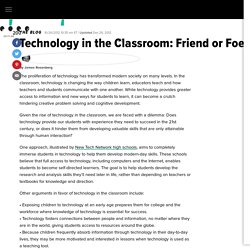
In the classroom, technology is changing the way children learn, educators teach and how teachers and students communicate with one another. While technology provides greater access to information and new ways for students to learn, it can become a crutch hindering creative problem solving and cognitive development. Given the rise of technology in the classroom, we are faced with a dilemma: Does technology provide our students with experience they need to succeed in the 21st century, or does it hinder them from developing valuable skills that are only attainable through human interaction?
One approach, illustrated by New Tech Network high schools, aims to completely immerse students in technology to help them develop modern-day skills. These schools believe that full access to technology, including computers and the Internet, enables students to become self-directed learners. The Pros and Cons of Technology. Using technology in the classroom is one of those issues that makes it easy to be a fence sitter.
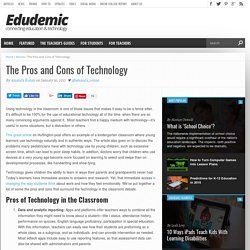
It’s difficult to be 100% for the use of educational technology all of the time, when there are so many convincing arguments against it. 5 Problems With Technology In Classrooms. 5 Problems With Technology In Classrooms by TeachThought Staff.
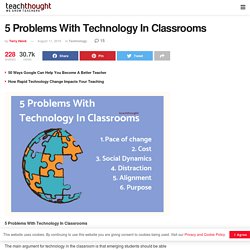
Why Some Teachers Are Against Technology In Education. ShareTwittPin Why Some Teachers Are Against Technology In Education by Terry Heick Some educators are upset.
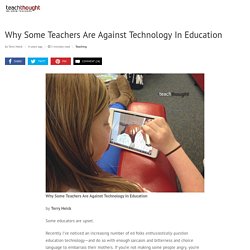
Recently I’ve noticed an increasing number of ed folks enthusiastically question education technology—and do so with enough sarcasm and bitterness and choice language to embarrass their mothers. If you’re not making some people angry, you’re probably not trying hard enough, but being “for” or “against” technology is a crude sentiment. I’ve been trying to understand it–and note, this isn’t even about whether or not #edtech is good or bad. This has a few net negative effects, among them a kind of permanent momentum where change comes and change goes. Failure is the change. What is the future of technology in education? A couple of weeks ago I was asked what I thought the future of technology in education was.
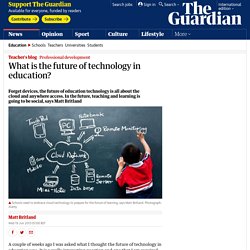
It is a really interesting question and one that I am required to think about all the time. Technology in Education: An Overview - Education Week. Published: February 5, 2016 In this 2015 photo, third grader Iyana Simmons works on a coding exercise at Michael Anderson School in Avondale, Ariz.
—Nick Cote for Education Week Technology is everywhere in education: Public schools in the United States now provide at least one computer for every five students. They spend more than $3 billion per year on digital content. Led by the federal government, the country is in the midst of a massive effort to make affordable high-speed Internet and free online teaching resources available to even the most rural and remote schools. To keep up with what’s changing (and what isn’t), observers must know where to look. There’s the booming ed-tech industry, with corporate titans and small startups alike vying for a slice of an $8 billion-plus yearly market for hardware and software. State and federal lawmakers, meanwhile, have wrestled in recent years with the reality that new technologies also present new challenges.
Homework debate: Too much, too little or busy work? - CNN. And I thought Miley Cyrus' performance at the VMAs generated a ton of opinions.

Ask parents how they feel about homework, as we did on CNN's Facebook page, and the response is immediate and intense. So many parents from all over the country sounded off passionately, saying we expect too much, too little or the wrong things from young students. As children go back to school and parents negotiate balancing family time and take-home assignments, parents shared that their children are stressed out and exhausted by the volume of homework they receive (so, too, are parents who say they've had to become drill sergeants in their own home to get it all done). Other parents said their kids aren't getting enough or any homework at all and they've had to create their own to keep their kids challenged. Is homework a good idea or not? - CBBC Newsround. Media playback is unsupported on your device Guide: Is homework a good idea or not?
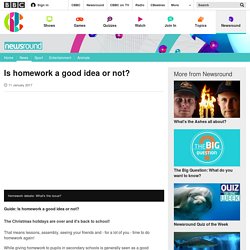
The Christmas holidays are over and it's back to school! Should homework be abolished? Why homework should be abolished.

The thing about home work is that it takes a lot of time I and others have to stay up all night finishing homework and kids shouldn't be over worked , or else they'll do badly in class I think its important for kids(including me) to have time to do things they love .Let's not forget we already have about 7 hours of school 5 days a week. A lot of times I have to miss family events and activites because of home work . Imagining the Ideal School. If you were to drop an elementary school student from 1912 into one of today’s classrooms, he would be positively frightened by the amount of innovation surrounding him: TI-82s rather than abacuses, iPads rather than notebooks, and YouTube videos rather than tutors.

And yet, if you asked that student from 1912 to name his favorite part of the school day, he would probably give the same answer as a student from 2012. Recess. Surely with all the tools we have in today’s schools, we’ve figured out a way to make learning more interesting, so that kids actually like coming to school — right? After all, wasn’t it the original point of schools to awaken an interest in knowledge? Ralph Waldo Emerson put it best when he said: Neatly-arranged desks, lectures from the front of the room, students passively taking notes — these are still the dominant features of a classroom.
It’s time for schools to recognize that a one-size-fits-all curriculum, in reality, fits nobody. Tablets out, imagination in: the schools that shun technology. In the heart of Silicon Valley is a nine-classroom school where employees of tech giants Google, Apple and Yahoo send their children. But despite its location in America’s digital centre, there is not an iPad, smartphone or screen in sight. Instead teachers at the Waldorf School of the Peninsula prefer a more hands-on, experiential approach to learning that contrasts sharply with the rush to fill classrooms with the latest electronic devices.
The pedagogy emphasises the role of imagination in learning and takes a holistic approach that integrates the intellectual, practical and creative development of pupils. But the fact that parents working for pioneering technology companies are questioning the value of computers in education begs the question – is the futuristic dream of high-tech classrooms really in the best interests of the next generation? “Those students who use tablets and computers very often tend to do worse than those who use them moderately,” he adds.